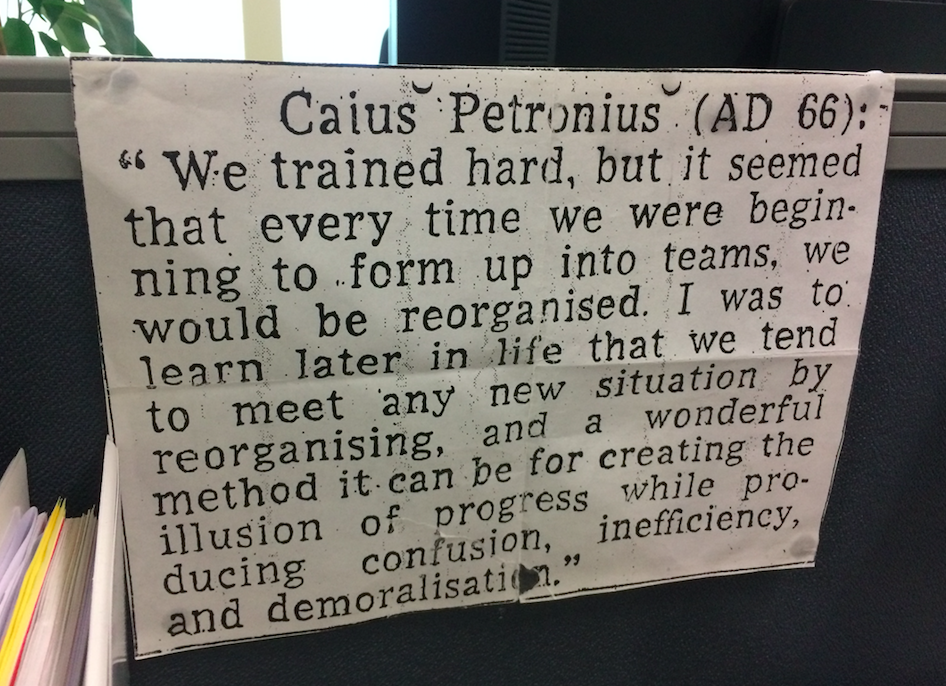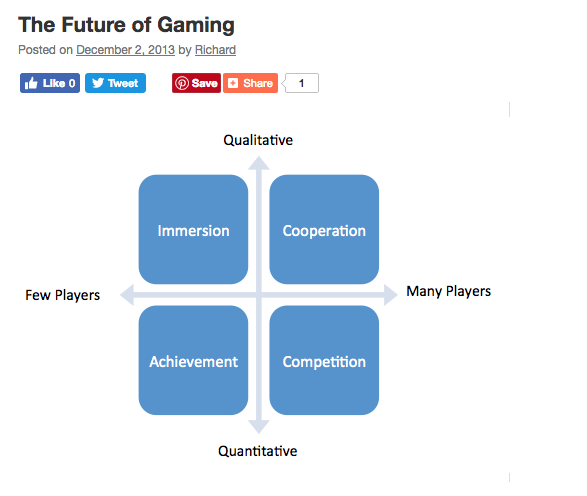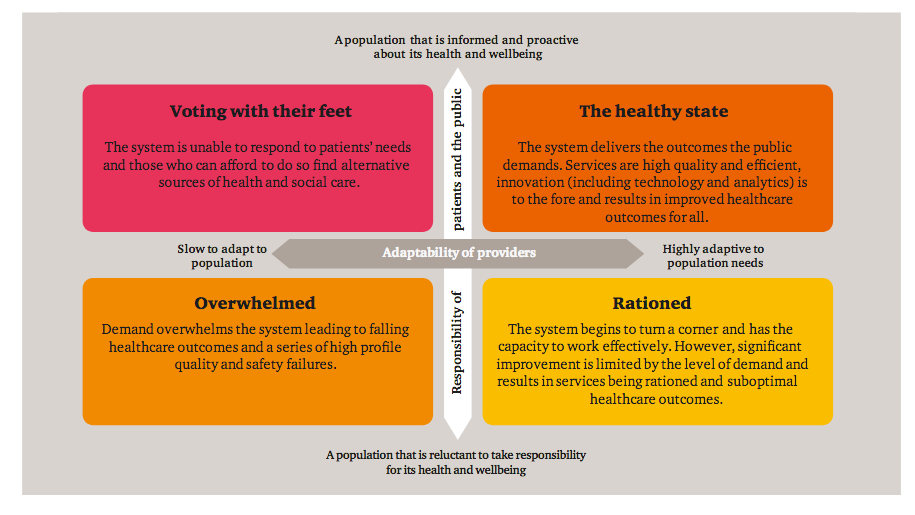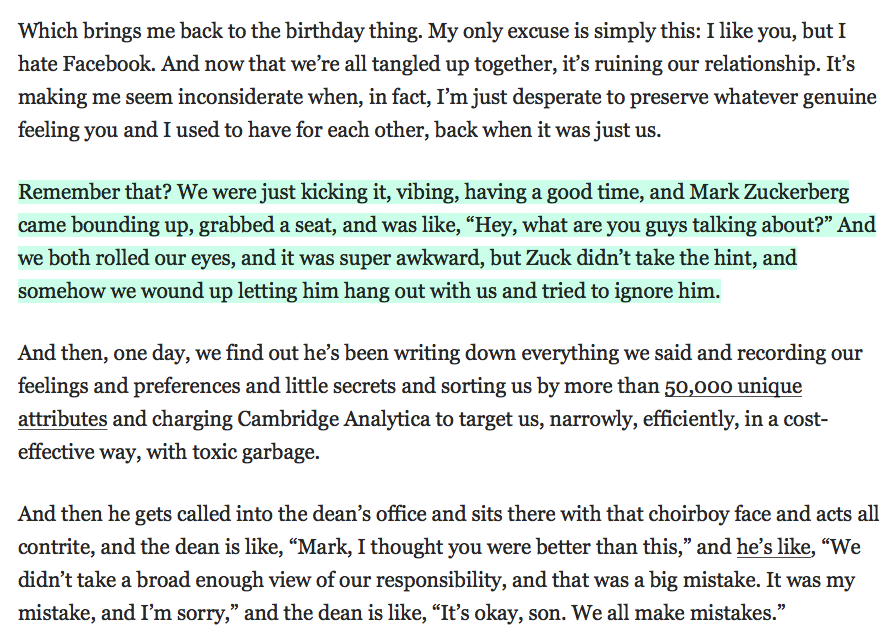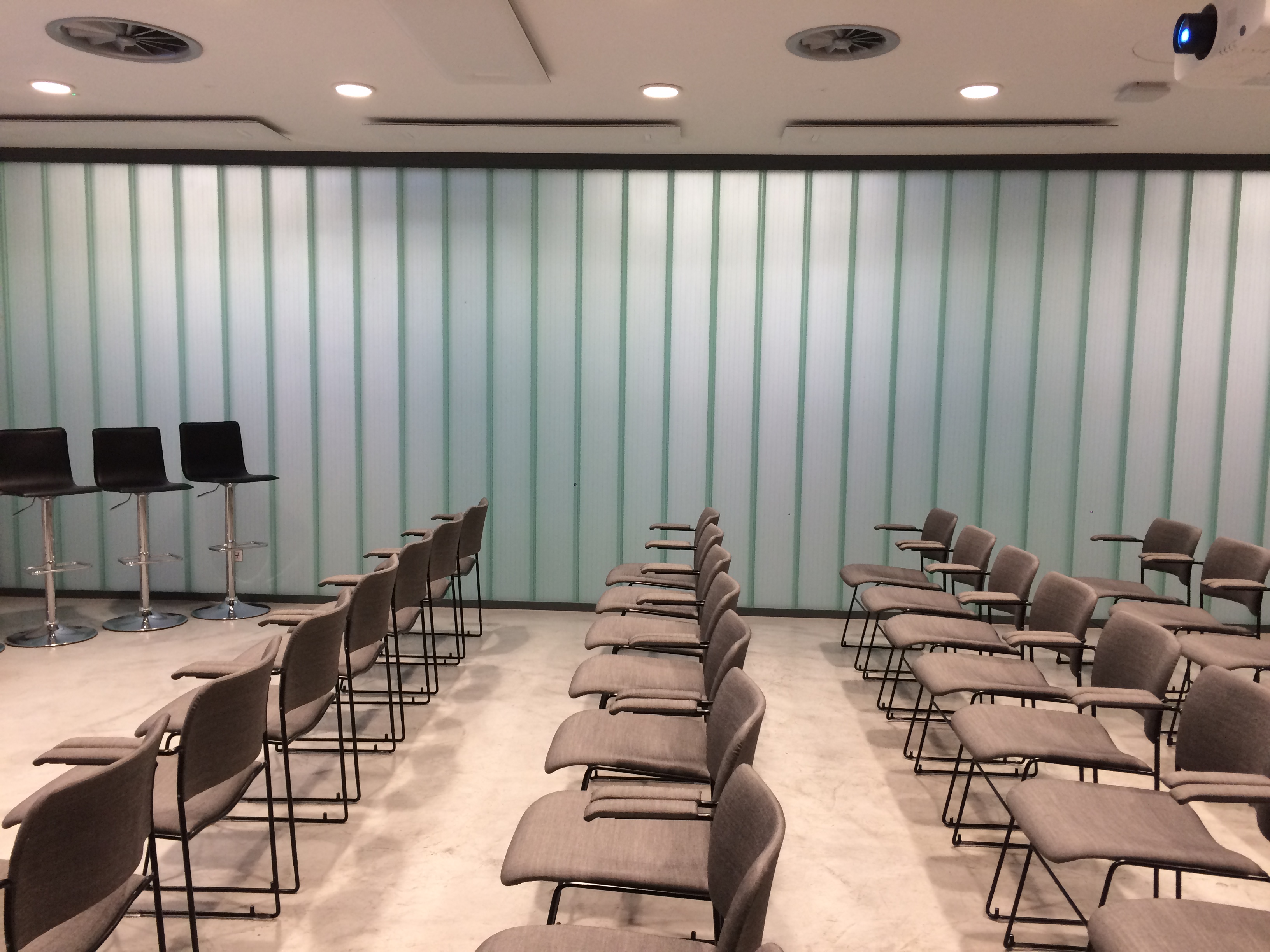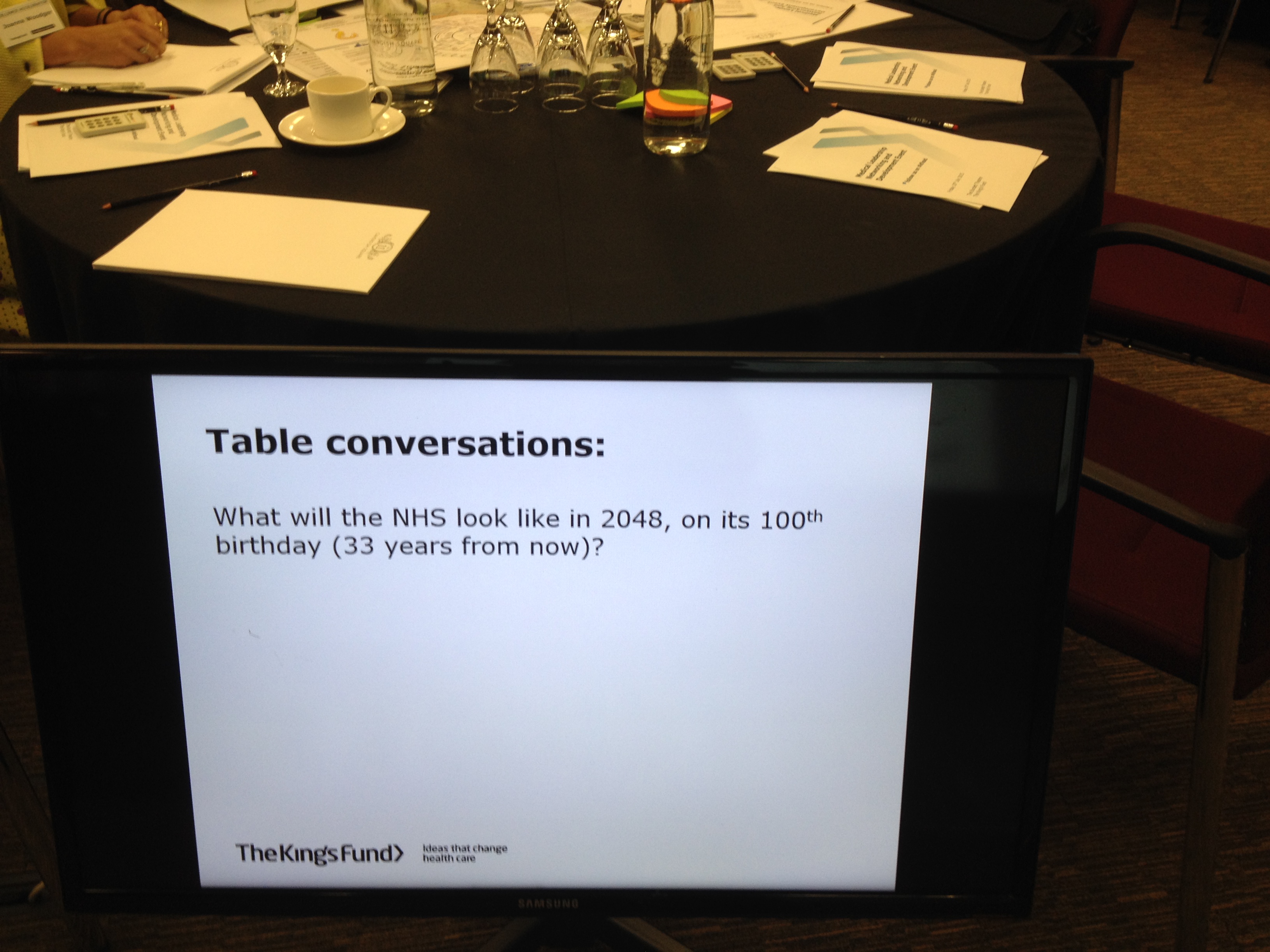Thanks to Ivona for this (it’s her desk).
Author Archives: Richard
Inevitable Surprises
I don’t know if this will ever make it into a book, but I wrote this over a year ago and given what’s happening with Brexit it’s perhaps worth putting out there…
Chapter 1: Thinking straight
“If we could first know where we are and whither we are tending, we could better judge what to do and how to do it. – Abraham Lincoln.
Slowly wind back your mind. To the 23rd June 2016 at 9.00am to be exact. You may have no idea what you were doing on this day, but I think I know what you were thinking, especially if you were living in Europe. I think you were thinking “Yes!”, “No!” or “WTF!!!”
23rd June 2016 was the day that the world woke up to the news that Britain had decided to leave the EU. I was giving a lecture to the leadership team of a bank, and from what I can recall, it was like herding cats in thick fog in the middle of a zombie apocalypse.
The bankers had been caught unawares. They were shocked that Britain had voted to leave. I was shocked that they were shocked. Honestly, had this not always been a yes or no vote? Had there not been two possibilities? I could understand that the decision hadn’t gone the way they’d wanted or expected, but total dead-eyed disorientated disbelief? We will never know exactly what was in these peoples’ heads, but I have a suspicion that the answer to their collective confusion might have been down to a heavy dollop of group think served with a light sprinkling of confirmation bias.
One big problem with achieving even a homeopathic level of success can be that one develops an enduring capacity to believe that your thinking is always correct, that the way you see the world is the same as any other right-thinking person would. Why bother really thinking about anything if you already know the answer? This situation is not helped by education systems that tend to teach that there is one correct answer. Exams generally teach us that things are true or false. They don’t teach maybe or that things depend on other related and frequently fluid factors.
This self-centred certainty, can result in major disagreements between individuals, but also in thinking that’s there’s no need for deep thinking. This tendency can work inside large organisations too. The more successful an organisation becomes the more blasé´ it gets about self-evident ‘truths’ and you can end up with a pyramid of egos, all convinced of their righteousness and all certain that there is little need to look at things differently. Even when due consideration occurs it tends it be short-term and reactive, not long-term and reflective.
There are endless away-days, strategy days and take your shoes off to be more creative days, but these rarely ponder beyond the next 18 months (36-months if you’re very lucky) or question fundamentals (or fundamental questions). Even CEOs, who are supposed to spend a great deal of time thinking about the long view, can get sucked into daily distractions and find it difficult to fix an appointment with themselves to just think.
Hence, what I’d term the unthinking organisation. Such organisations can be likened to reanimated corpses. These are zombie-like organisations that wander around in a mindless manner sinking their teeth into anyone with a different opinion or a free mind.
They are dead from the neck up, although they still manage to have a highly efficient immune system that forcefully rejects any alien thought or new idea. Maybe it’s why the average lifespan of an S&P 500 company in the US has fallen from 67 years in the 1920s to just 15 years today and why 75 per cent of firms in the S&P 500 now will be gone – or going – by the year 2027. These figures come from a study by Richard Foster at the Yale School of Management and echo a similar study from the Santa Fe Institute that found publically quoted firms in the US die at similar rates regardless of age or industry sector.
In the UK, it’s a similarly skeletal story. Of the 100 companies in the FTSE 100 in 1984, only 24 were still breathing in 2012. Nothing recedes like success or so it seems. Why do organisations behave like this? (why do they die like this?). I think it’s because they think they think, but they don’t really. Their thinking is largely tactical and bounded by conventional wisdom. It’s largely about plucking some numbers out of the sky and then working backwards to explain how these numbers will come into being. This can work well for a while, a long while in some instances, but if the wider operating environment becomes complex, volatile and ambiguous it’s usually only a matter of time before what used to work doesn’t any longer. These organisations then get ambushed by what is happening outside of them: specifically, new technologies, new competitors, new business models, new economics, shifting social attitudes and behaviours and geopolitical change.
Why aren’t large organisations in particular more open minded? Some are. The Ministry of Defence in the UK and the Department of Defence in the US both ponder the imponderable, not because they will necessary be 100% right, but because they don’t want to be 100% wrong. Reducing magnitudes of error in combat can literally save lives. But most large organisations don’t do this. They are like super-tankers approaching an iceberg. Having finally decided that an object on the radar is indeed an iceberg, there’s a long discussion on the bridge about the need to turn and at what speed and in which direction. But then it takes ages for the ship to actually turn. It’s all very well talk about organisations ‘pivoting’ but my experience is that most are incapable. The only organisations that can and do change direction rapidly are small start-ups, where again it’s often a matter of life and death.
Exhibit one: Group Think. This idea was first put forward by Yale psychologist Irving Janis in 1973 and sought to explain why groups of smart people often make terrible decisions. The problem, as he saw it, is that groups tend to seek solidarity, harmony and consensus and work actively to supress any form of dissent. This is the main reason, I believe, that the bank mentioned earlier failed to see the possibility of Brexit occurring.
Exhibit two: Confirmation Bias. Groups can display collective confirmation bias, but the term is best applied to individuals and describes the way in which people tend to favour information, data (and individuals) that broadly reflect what they already think or believe.
In other words, we all inhabit echo chambers where our views, opinions and strongly held beliefs are reflected back to us and go unchallenged. Social media has made this far worse, amplifying what used to be a local phenomenon into a global one. Because both these biases, but especially confirmation bias, operate at a subconscious level, blocking any incoming information from reaching our conscious minds, it’s hard to be aware of what’s going on, let alone make allowance for it. In a sense, none of this stupidity is our fault.
To give the bank credit, I understand that they had made mild preparations for a ‘no’ vote in the referendum, but even so it was fascinating to observe how group think, in particular, played out. The bank was based in London. Everyone, more or less, lived close to the capital. Most of the people these people knew also worked and lived near London and probably thought more or less like they did. It was essentially a self-referencing group.
So how might the leadership team have challenged their own thinking? One way might have been to widen their intelligence gathering operations. I imagine that most read publications such as The Banker and probably the Economist (but doubtfully all of it). Probably the Financial Times too. Had they read The Sun or watched Daytime television or listened to talk radio they might have thought differently. Better still, perhaps they could have left their dozy desks and visited some of their own branches outside London.
Speaking directly to staff, and especially to customers, rather than relying on research reports and the media, (the latter again largely located in and focussed on London) may have opened their eyes to the idea that some people thought that local identity might trump global economics. Interestingly, it could be argued that both Brexit and Trump are connected to something else people can’t see, namely ageing populations. The problem here, once again, is that most organisations are staffed by people in their 20s, 30s, 40s and 50s and it’s hard for them to imagine what’s in the heads of people in their 60s, 70s, 80s and 90s.
So, my lecture wasn’t going quite as expected. But then, to make matters worse, I suggested that Britain might not leave the EU. At this point the leadership team probably decided that I was certifiable. Had we not just voted to go? So how could we possibly stay? Are you nuts? But, of course, impossible is often a matter of opinion. One distinguishing feature of the future is precisely that it’s so vague. It’s always a moving target too. Anyone that thinks otherwise will eventually get run over by reality. In almost any instance you can imagine, there’s always more than one way things can turn out. It’s usually about probabilities, not inevitabilities, but even here we tend to be hopeless at judging the odds.
Not to be continued (as far as I can see).
Scenarios from the past
Unreal
Reminds me of the G8 summit in Northern Ireland in 2013 when local officials covered up abandoned shops with posters so that the G8 delegates couldn’t see what was really happening to the town economically. In one former butcher’s shop stickers were applied to the windows to show a shop packed with meat counter giving the impression of prosperity.
Predictions about the Future
“Every prediction, consciously or unconsciously, is a critique of both present and past” (Source: me having a rare moment of clarity)
Image: futuristic city wallpapers
The Future of Cities (a childlike perspective from Lego)
I think I’ve found my intellectual level – under ten-year-olds. Please note that the competition entry link might not appear (nothing to do with me!).
Trends Vs Fads
Is this a trend, a counter-trend or a fad?
It’s not a trend to my mind – not large enough in scale or fast enough in velocity. It could be a classic counter-trend. The bigger a macro-trend the greater the chance that a micro-trend will emerge as a balancing force in my experience (e.g. globalisation drives localisation, fast food drives slow food, digitalisation drives craft). I think this is a fad driven by a certain demographic (nostalgic), but also a kind of reverse /ironic status.
In the case of phones though, there’s also a real need. The low-cost dumbphone was originally designed to appeal to poor users in Asia and especially Africa. They now appeal to people seeking a cheap phone that won’t get stolen, won’t break if dropped, won’t act as a tracking device and won’t run out of battery life in an emergency.
The Nokia 3310, for example, isn’t the future of phones, far from it, but it is part of a longing for simplicity. It’s one species within a complex ecosystem of technical diversity.
Facebook Fatigue
Sums it up pretty well. The other metaphor I quite like is that it’s like you’ve been going to confession for about ten years and you suddenly find out that everything you said to the priest has been sold on to third parties. The other thing about Zuckerberg is I honestly don’t think he understands what the problem is.
Thinking Spaces: the good, the bad (& the totally mad)
I’m getting more and more interested in how physical environments influence how people think. I see this every other week doing talks, sometimes in good venues, sometimes in bad. I also get to see the impact of different types of physical space on workshop outputs on a fairly regualr basis. Takeaway? Not enough thought (or budget) is given to where people think, both individually and collectively.
Some recent examples:
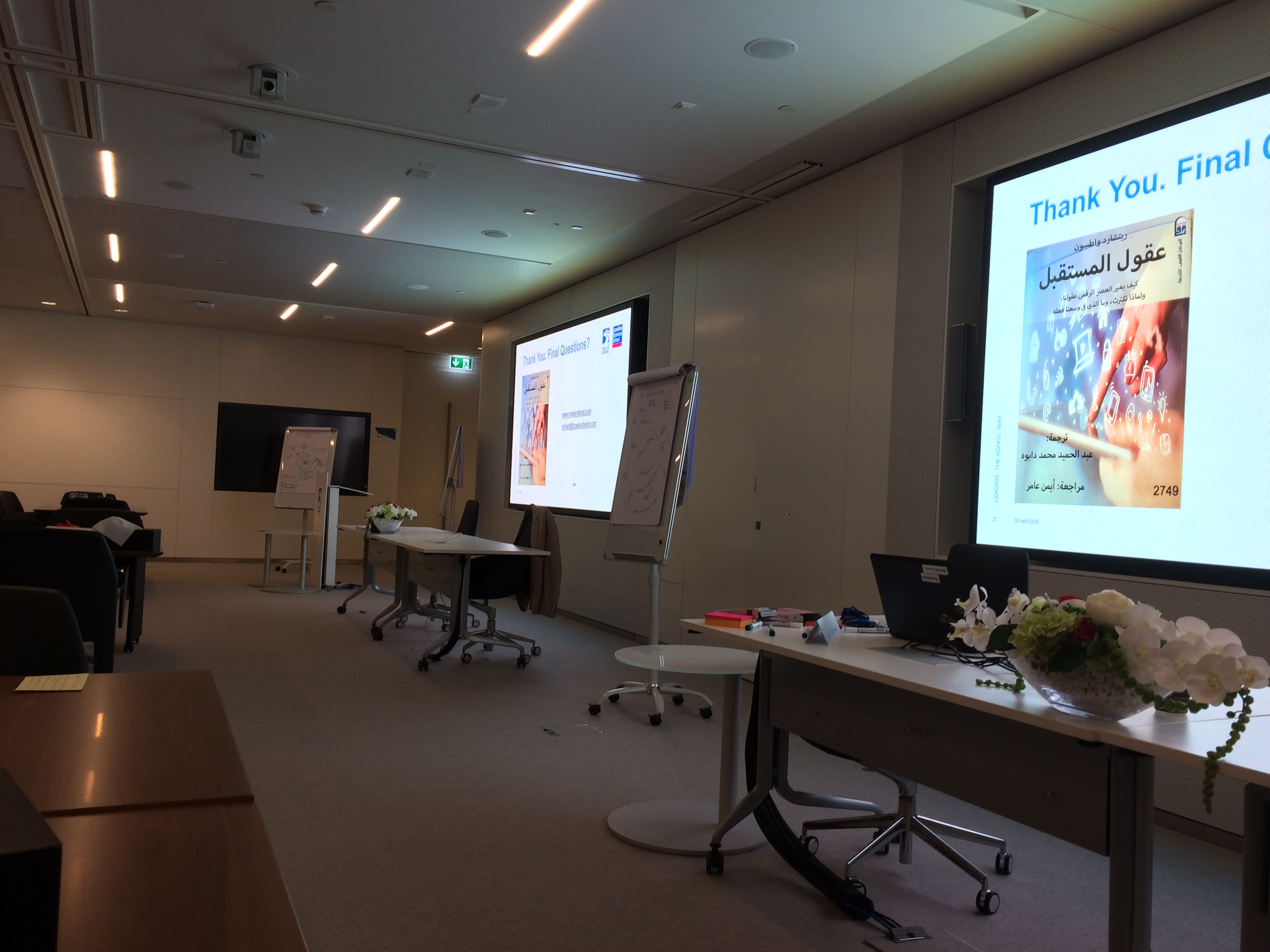 Picture 1 (above): Windowless training room inside a company in the Middle East. Perfectly standard room, nothing wrong with it in a sense. But in no way inspirational.
Picture 1 (above): Windowless training room inside a company in the Middle East. Perfectly standard room, nothing wrong with it in a sense. But in no way inspirational.
Picture 2 (below): Same building, but the view from a rest area 10 metres outside the training room. An expansive view seems to open the minds of people to future possibilities in my experience.
Picture 3 (below): Windowless basement at a panel discussion that I attended for some architects of all people. You’d think these, of all people, might be thinking about this.
Picture 4 (below): A view, natural light and fresh air at Imperial College. Decor a bit old fashioned, but I’ve seen far worse.
Picture 5 (below): Another basement (at Imperial College). I’m still not a fan of basements, but this one worked quite well because of natural light simulation that changed by time of day. The colour white can work well too.
Picture 6 (below): This was a great venue. A private room in an historic pub close to Canary Wharf. Water again!
Maddest venue? I once organised a workshop on a boat (HMS President on the River Thames). It worked a treat, partly, I think, because we weren’t on land, but we weren’t really on the water either (it didn’t go anywhere). There was movement (the river plus the tide) and a slight rocking motion, although that might have been the wine. Weird, but it worked.
PS…always use tables with round edges. Never square tables!
Exams Don’t Predict Anything
Commenting in the New York Times last year, Laszlo Bock, then Senior Vice President of People Operations at Google, said that: “For every job, the No. 1 thing we look for is general cognitive ability, and it’s not IQ. It’s learning ability. It’s the ability to process on the fly. It’s the ability to pull together disparate bits of information.Grade Point Averages are worthless as a criteria for hiring, and test scores are worthless. We found that they don’t predict anything.”

